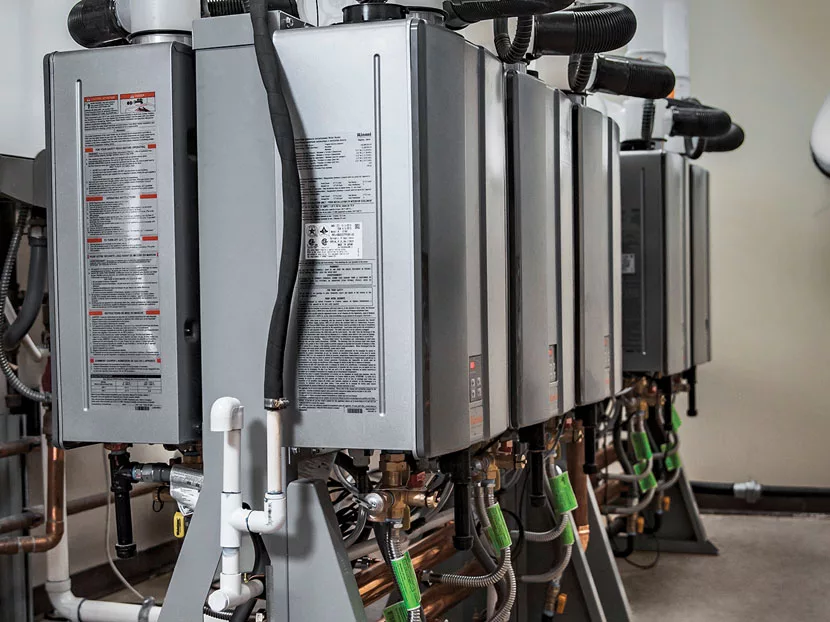Trusted to run hot, not run out. Water heating is a major energy consumer in commercial buildings. Many facility owners and operators have a critical need for water heating systems that are reliable, able to meet varying levels of demand, energy efficient and can fit within a building’s space constraints to maintain their business operations.
Many propane tankless water heaters are called upon to help meet a building’s needs, handle high-peak demand and reduce energy. Known for their compact, space-saving design and endless, on-demand hot water supply, propane tankless systems can provide water heating to a wide variety of applications such as restaurants, multifamily buildings, hospitals, laundromats, salons, health clubs, educational facilities and hotels.
A high-performance, energy-efficient water-heating solution, commercial propane tankless systems also offer an environmental impact that aligns with projects requiring green technologies — such as LEED certification, for example.
Plumbing professionals should know the three primary benefits of propane tankless systems when considering a water heating solution for any commercial building.
No.1 Tankless systems are perfect
for commercial projects
Effective in both new projects and as replacements for existing storage tank systems, propane tankless water heaters offer a high-performance water-heating solution for commercial applications.
These units don’t store water. Instead, they have a gas burner that ignites to heat water only when a faucet, appliance or other demand event occurs. It means no standby losses, unlike storage tank models, so building owners aren’t paying to heat water they aren’t using.
The technology’s tankless design avoids the excessive energy use of storing large volumes of hot water and greatly reduces the space requirements for the system, saving valuable square footage in a commercial building.
Still, these systems come in a variety of sizes and capacities. Multiple tankless units can be grouped together to satisfy diverse temperature and flow-rate demands in commercial buildings. For example, a banked configuration can supply water at 110 F at a low flow rate to a faucet and 180 F at a high flow rate to a commercial dishwasher.
No. 2 Energy-efficiency is second-to-none
One of the most important benefits of tankless units to building owners and operators is their energy-efficient operation and the cost savings that result. Propane tankless units achieve efficiency ratings of up to 98 percent. Many use a condensing design, where additional thermal energy is extracted from the combustion gasses to heat incoming water.
One clear indication of the efficiency of tankless units is the Energy Star label. Energy Star-rated units have the potential to use 25 percent less energy than a conventional commercial water heater. Tankless systems which are eligible for the Energy Star commercial water heater label have a capacity greater than 200,000 BTUs per hour, a thermal efficiency of 0.94 or higher and an Energy Factor of 0.93 or higher.
Also, a propane tankless system’s lifecycle can span up to 20 years, strengthening its value proposition in commercial applications. Plus, propane tankless water heaters offer attractive paybacks, better reliability and long-term energy savings — all helping to offset the higher initial capital cost.
It’s important for building owners and engineers to consider electric demand charges when comparing propane tankless systems with commercial electric storage tanks. Along with the electric rate a facility will pay per kilowatt-hour, most commercial utility tariffs also include a demand charge based on the peak demand drawn by the facility. This charge reflects the load that the facility places on generation and transmission systems and can be as high as several hundred dollars per month.
A key strategy in reducing the demand charge and lowering overall energy costs is to limit the demand from large electric equipment — including high kW-rated electric water heaters. This should be taken into account in any analysis of propane vs. electric equipment.
No. 3 They decrease a building’s carbon footprint, too
Nearly all water heating systems will have some environmental impact linked to their operations in the form of carbon emissions. That said, propane tankless systems enable a commercial building or facility to lessen its impact on the environment — which is great for buildings with environmental standards to maintain or green certifications to reach.
With electric systems, the upstream electric power generation creates carbon emissions when the generation is fossil fuel-based (coal, for example). Based on energy and environmental analysis of different energy sources, propane tankless systems offer 50 percent lower carbon emissions compared with electric storage tank systems, and roughly 33 percent lower carbon emissions compared with heating-oil storage tank systems in the Northeast.
These numbers reflect water heating systems in small commercial buildings, but the emission advantages of propane tankless units scale to larger systems, too.
Further, propane-fueled tankless water heaters emit up to 57 percent lower greenhouse gas emissions compared with electric tankless models in both residential and commercial applications.
Building owners often look to propane tankless systems to help handle high peak demand and reduce energy. The efficiency, versatility and reliability of propane make it an outstanding choice for critical commercial building systems.





